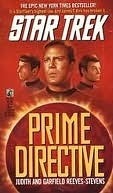What do you think?
Rate this book


406 pages, Kindle Edition
First published September 1, 1991
The Starfleet Lunar Hall of Justice in Oceanview was one of those peculiar government buildings that seemed to have no particular style, other than a quest for monumentalism. It was close to a century old and had been built in the twilight of Earth's cultural fascination with anything Centauran. Unfortunately, the fact that it had been built on the Moon under natural gravity -- long since augmented to Earth normal throughout the city's business sections -- had inspired the architects to alter the proportions of loadbearing arches whose original graceful dimensions had been dictated by a more massive planet. In addition, the building's airy roof gardens were situated five meters beneath the inner surface of a dingy green pressure dome instead of under spacious blue skies, further removing it from the Centauran ideals of open post-harmony defensism.
McCoy stood in the plaza before the ungainly structure, wondering how anyone could have become enamored of an architectural style that had arisen on a world where people spent most of their time burying things underground so they couldn't be detected by hypothetical enemies from space. That cultural paranoia, supported by fiber optic data transmission that prevented stray radiation from leaking out into space, had kept Earth's first expedition to another star from discovering there was an inhabited, technologically advanced civilization virtually next door until the first shuttles were almost ready to land. The members of the Federation are all so eager to find new life and new civilizations, McCoy thought, but when we find it, none of us wants to go first. Maybe that was the real reason for what had happened on Talin: not that Kirk had been engaged in brash adventurism, but that everyone else involved, including the First Contact Office, had been too cautious.